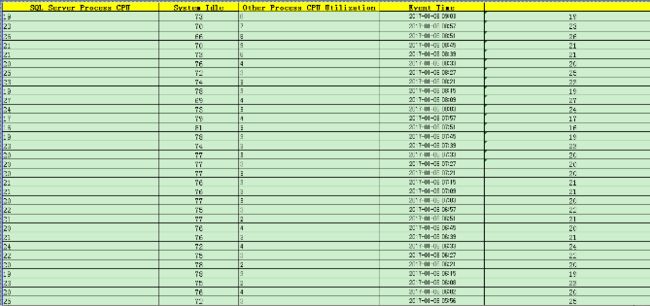This is all begins from a mail.
...
Dear sir:
This is liulei.
Thanks for your help about last PM for data migration to SSD storage. However, it is still important for monitor SQL server inefficient
SQL statements.
I can do nothing before without thrid part database monitor software. Does it means we have no idear to fix it ?
The answer is NO. This mail is the answer.
First, I would like to introduce some script.
checkCPU -- check CPU status every 6 minutes about 255 records
getperformancetest -- the original script is copied from yours, I made it as a procedure and conver xml data to nvarchar(max)
-- CAST(qp.query_plan AS nvarchar(max)) , you will know why I did like that.
linkserver_LN_N4TEST --make link server from empty server which getting and collecting all information from clients.
-- if we decide save record table at each client. That is not necessary.
checkperformance -- check and get performacnce top 10 data local version, store result tables at client database
checkperformancetest -- check and get performacnce top 10 data remote version, store result tables at dedicated server
showdelperftable -- collect performance tables
checkoldtable2 -- check and drop performacd tables any days before , like oracle AWR.
mssql_cpu_status_check_test.xlsm -- we can get checkCPU result from this excel and we can check this performance table result if
I need to check SQL information result.
we can set checkperformance or checkperformancetest as agent job evert 6 minutes.
That is all about simple way to monitor SQL server SQL performance.
============================
checkCPU:
CREATE PROCEDURE [dbo].[checkCPU]
AS
BEGIN
DECLARE @ts_now bigint = (SELECT cpu_ticks/(cpu_ticks/ms_ticks)FROM sys.dm_os_sys_info);
SELECT TOP(500) SQLProcessUtilization AS [SQL Server Process CPU Utilization],
SystemIdle AS [System Idle Process],
100 - SystemIdle - SQLProcessUtilization AS [Other Process CPU Utilization],
DATEADD(ms, -6 * (@ts_now - [timestamp]), GETDATE()) AS [Event Time]
FROM (
SELECT record.value('(./Record/@id)[1]', 'int') AS record_id,
record.value('(./Record/SchedulerMonitorEvent/SystemHealth/SystemIdle)[1]', 'int')
AS [SystemIdle],
record.value('(./Record/SchedulerMonitorEvent/SystemHealth/ProcessUtilization)[1]',
'int')
AS [SQLProcessUtilization], [timestamp]
FROM (
SELECT [timestamp], CONVERT(xml, record) AS [record]
FROM sys.dm_os_ring_buffers
WHERE ring_buffer_type = N'RING_BUFFER_SCHEDULER_MONITOR'
AND record LIKE '%
) AS y
ORDER BY record_id DESC;
END
GO
checkoldtable2
CREATE PROCEDURE [dbo].[checkoldtable2] @days int
AS
BEGIN
declare @m int
declare @n int
declare @tmp nvarchar(MAX)
/*
if object_id('tempdb..#droptableList') is not null
drop table #droptableList
else
CREATE TABLE #droptableList(id int IDENTITY(1,1) NOT NULL,contents VARCHAR(35) NOT NULL)
SET NOCOUNT ON
INSERT #droptableList (contents) exec showdelperftable @days
set @m=(select count(*) from #droptableList)
--select * from #droptableList -- where id=1
set @n=1
while @n<=@m
begin
set @tmp=(select contents from #droptableList where id=@n)
--exec (@tmp)
print (@tmp+CHAR(5))
end
set @n=@n+1
*/
declare @droptableList TABLE (id int IDENTITY(1,1) NOT NULL,contents VARCHAR(35) NOT NULL)
SET NOCOUNT ON
INSERT @droptableList (contents) exec showdelperftable @days
set @m=(select count(*) from @droptableList)
set @n=1
while @n<=@m
begin
set @tmp=(select contents from @droptableList where id=@n)
exec (@tmp)
--print (@tmp+CHAR(5))
set @n=@n+1
end
end
GO
checkperfprmance
CREATE PROCEDURE [dbo].[checkperformance]
AS
BEGIN
DECLARE @SQL2 VARCHAR(MAX)
DECLARE @createtable VARCHAR(MAX)
DECLARE @inserttable VARCHAR(MAX)
DECLARE @inserttable2 VARCHAR(MAX)
DECLARE @@tablename2 VARCHAR(MAX)
SELECT @SQL2 = (select replace(replace(replace(CONVERT(varchar, getdate(), 120 ),'-',''),' ',''),':',''))
--set @createtable='create table perf_'+@SQL2+' (dbname varchar(20),logSizeMB float,logSpaceUsedPct float,Status int);'
set @createtable='create table perf_'+@SQL2+' ([SQL_TEXT] [nvarchar](max),[execution_count] [numeric](18, 0),[avg_worker_time] [numeric](18, 0),[avg_elapsed_time] [numeric](18, 0),[avg_physical_reads] [numeric](18, 0),[avg_logical_reads] [numeric](18, 0),[query_plan] [xml]) ON [PRIMARY] TEXTIMAGE_ON [PRIMARY];'
exec(@createtable)
--set @inserttable='insert into perf_'+@SQL2+' EXEC ("DBCC SQLPERF(LOGSPACE)")'
set @inserttable='insert into perf_'+@SQL2+' EXEC [dbo].[getperformance]'
--set @inserttable2=(select replace(@inserttable,'"',''''))
set @inserttable2=(select replace(@inserttable,'"',''''))
exec(@inserttable2)
END
GO
checkperformancetest
CREATE PROCEDURE [dbo].[checkperformancetest]
AS
BEGIN
DECLARE @SQL2 VARCHAR(MAX)
DECLARE @createtable VARCHAR(MAX)
DECLARE @inserttable VARCHAR(MAX)
DECLARE @inserttable2 VARCHAR(MAX)
DECLARE @@tablename2 VARCHAR(MAX)
SELECT @SQL2 = (select replace(replace(replace(CONVERT(varchar, getdate(), 120 ),'-',''),' ',''),':',''))
--set @createtable='create table perf_'+@SQL2+' (dbname varchar(20),logSizeMB float,logSpaceUsedPct float,Status int);'
set @createtable='create table perf_'+@SQL2+' ([SQL_TEXT] [nvarchar](max),[execution_count] [numeric](18, 0),[avg_worker_time] [numeric](18, 0),[avg_elapsed_time] [numeric](18, 0),[avg_physical_reads] [numeric](18, 0),[avg_logical_reads] [numeric](18, 0),[query_plan] [xml]) ON [PRIMARY] TEXTIMAGE_ON [PRIMARY];'
exec(@createtable)
--set @inserttable='insert into perf_'+@SQL2+' EXEC ("DBCC SQLPERF(LOGSPACE)")'
-----set @inserttable='insert into perf_'+@SQL2+' EXEC [dbo].[getperformance]'
set @inserttable='insert into perf_'+@SQL2+' SELECT sql_text,execution_count,avg_worker_time,avg_elapsed_time,avg_physical_reads,avg_logical_reads, CAST(query_plan AS xml) query_plan FROM openquery([LN_N4TEST],''exec [dbo].[getperformancetest]'')'
--set @inserttable2=(select replace(@inserttable,'"',''''))
set @inserttable2=(select replace(@inserttable,'"',''''))
exec(@inserttable2)
END
GO
getperformancetest
CREATE PROCEDURE [dbo].[getperformancetest]
AS
BEGIN
SELECT TOP 10
Left(SUBSTRING(qt.TEXT, (qs.statement_start_offset/2)+1
, ((CASE qs.statement_end_offset
WHEN -1 THEN DATALENGTH(qt.TEXT)
ELSE qs.statement_end_offset
END - qs.statement_start_offset)/2)+1), 200) AS "SQL_TEXT"
, qs.execution_count
, qs.total_worker_time /qs.execution_count/1000 as avg_worker_time
, qs.total_elapsed_time /qs.execution_count /1000 as avg_elapsed_time
, qs.total_physical_reads /qs.execution_count as avg_physical_reads
, qs.total_logical_reads /qs.execution_count as avg_logical_reads
--, qp.query_plan
, CAST(qp.query_plan AS nvarchar(max)) query_plan
FROM sys.dm_exec_query_stats qs
CROSS APPLY sys.dm_exec_sql_text(qs.sql_handle) qt
CROSS APPLY sys.dm_exec_query_plan(qs.plan_handle) qp
WHERE qs.last_execution_time > dateadd(minute, -1, getdate())
ORDER BY qs.total_elapsed_time/qs.execution_count DESC
END
GO
showdelperftable
CREATE PROCEDURE [dbo].[showdelperftable] @days int
AS
BEGIN
select 'drop table dbo.'+name from sys.tables where name like 'perf_%' and create_date < dateadd(day, @days, getdate())
order by name asc,create_date asc
END
GO
